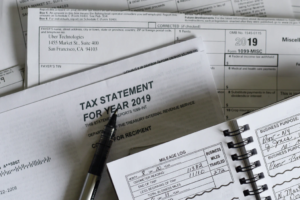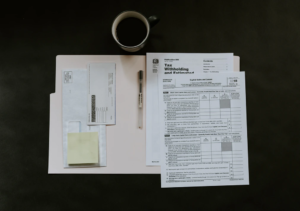
One of the most common audit reasons is because you are reporting too high or too low amounts on your taxes. The IRS has a lot of tools to help them audit people, and one way they use these tools is by matching the numbers on your tax form with other information that they have about you. If there are any discrepancies in those numbers, then it’s likely that you will get audited.
You Have an Unusually High Income
One of the reasons why you might get an audit by the IRS is if you have an unusually high income.
It’s important to be aware of your tax liability and report any changes in your income or deductions right away. You can reduce the chances of being audited by having a good paper trail that documents all transactions, especially unrealized capital gains on investments.
If you also own another business with different accounting methods than those used for the first business, it may make sense for them to file separately from one another.
You should consult with a professional accountant before starting this process because they will need more time and there are some complicated rules related to these types of businesses filing as separate entities versus single corporations (e.g., subchapter S corporation). The rate at which you are audited is higher for a corporation than it would be if the business was filing as an individual.
If your audit rate has increased, this may also indicate that there’s something off with your tax forms and receipts.
Your audit probability might increase if you have been making changes in previous years to income or deductions, or even not having them all accounted for on those returns. It’s best to check how many audit notices were sent out each year – usually, they’re around one percent of taxpayers (so only about 100 people per million) but some audit rates can rise much more quickly if someone finds discrepancies like mismatched numbers between different documents provided by the taxpayer/business.
You’re Self-employed and Haven’t Been Paying Taxes

Audits can happen to anyone, even if they think there’s nothing for the IRS to audit them on! Oftentimes these audits are just a “check-up” type audit and not anything major. But it never hurts to be proactive when dealing with tax return audit notices from the IRS or state agencies – even though most people will get past this audit without any problems.
It could also mean that something wrong has happened where some income (or deduction) hasn’t been reported.
There are many audit triggers that could result in an audit from the IRS.
If you have been self-employed and haven’t fulfilled your tax obligations, then it’s going to make it easier for a government agency such as the Internal Revenue Service (IRS) to audit you because they know with certainty that there will be mistakes or inconsistencies on their end when compiling your taxes.
The first thing you should do if you receive notice of an audit is contacting a lawyer or federal prison consulting firm – this way they can help advise how best to deal with the situation.
You’ll need more information than what was included in the notice letter about who/what type of audit and why so speak up!
Your Business Has a Lot of Cash Transactions
IRS audit rates are always in the news. But what you may not know is that business owners with large cash transactions can also be audited by the IRS. Businesses with a lot of cash transactions could come under audit for various reasons:
- The amount of money coming into or going out of your business;
- Employees’ tips and wages;
- Cash sales, though they don’t need to be a high volume;
- Unreported income from other sources like side jobs;
Since most people are intimidated by the IRS, you should get as much information as you can beforehand. If you have any concerns about being audited by the IRS, contact an accountant or read here to see how to address your concerns. It is always better to get educated on the topic before it’s already too late.
You’ve Made Several Large Charitable Donations
Another audit indicator is making large charitable donations. The IRS may audit you if they think your records are not accurate or the number of your contributions doesn’t match up with what was reported on previous years’ tax returns.
You Work for Someone Else But They Haven’t Paid All the Taxes on Your Behalf
You get your paychecks as a contractor but the company you work for has not paid its taxes or doesn’t have good records. This means that when they audit, if it is discovered by IRS agents that the employer did not file correct information on their behalf, then they are going to be held accountable and could be penalized with fines and penalties. For this reason, many contractors make sure that their employers have submitted all of the necessary paperwork so there’s nothing hanging over them at any point in time.
Your Employer Hasn’t Withheld Enough Money from Your Paycheck to Cover Federal Withholding Taxes
It is the responsibility of an employer to make sure that they withhold enough money from your paycheck so you don’t end up with any penalties and fines. This means making sure that they pay federal withholding taxes, which cover things like Social Security and Medicare. If you find out at audit time that your employer didn’t do this or did it incorrectly then there will be consequences for them as well as you.
You Have Not Reported All Sources of Income in a Tax Return
When people submit their taxes, there are two ways to fill out the form: first by going through each line item on their W-2018 form (or similar) and checking off “Yes,” if they have receipts (“Forms”) proving their deductions.
You may be able to deduct a significant amount of your income from taxes. If you think this is something that applies to you, please contact us for more information about how we can help with tax preparation and filing or discuss it in greater detail during our complimentary consultation. We’re here to make sure the process goes as smoothly as possible so you get back what’s rightfully yours!





Getting audited by the IRS can happen for various reasons. It could be due to random selection, errors or discrepancies in your tax return, high income or complex returns, claiming significant business expenses or home office deductions, large charitable deductions, or having offshore accounts or foreign income. While these factors can increase the likelihood of an audit, it’s important to ensure accuracy and compliance with tax laws to minimize the risk.